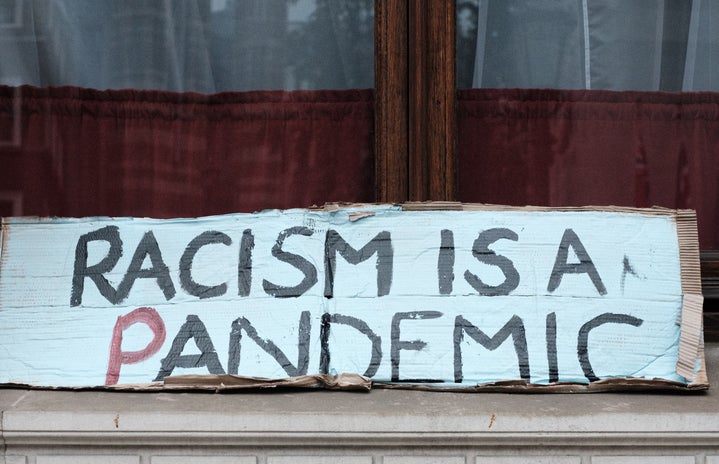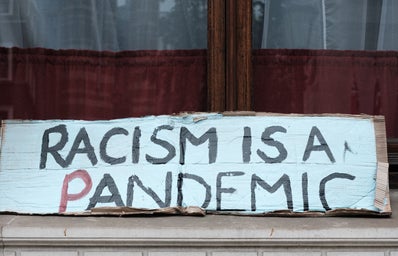A few weeks ago, I watched a video of a 19-year-old Asian boy getting shot and killed by police. His name was Christian Hall, and this wasn’t an isolated incident; it’s just one example of the many anti-Asian hate crimes that have occurred since the beginning of the coronavirus pandemic.
When I first noticed the recent rise in anti-Asian violence, I was surprised by my own reaction. I didn’t feel outraged, nor did I feel sad. I felt exhausted. Even worse than that, I felt numb. But to claim that I’m completely unaffected by recent events would be false. As an Asian-American, I do feel personally affected by these attacks. To be quite honest, anti-Asian racism is something I’ve come to expect. And, over the past year, in particular, I’ve often feared being targeted because of my race.
Back in March 2020, my mother called me and told me that she was afraid to sneeze in public. She confided in me that she feared she might become yet another target of anti-Asian violence. My mom advised me to sport the following outfit when going out in public: a mask that covered the better half of my face, large sunglasses, and a baggy sweatshirt with a hood. She told me if I dressed like this no one would be able to tell that I’m Asian. Even now, I sometimes find myself feeling paranoid, but I don’t attempt to conceal my racial identity anymore (but I do wear two masks now, per medical experts’ advice).
Though the pandemic gave rise to new anxieties surrounding my racial identity, it by no means marked the beginning of racism against the Asian-American community. I think a lot of people have been shocked by the recent attacks, because there are many misconceptions surrounding racism against the Asian-American community.
For example, contrary to the belief that anti-Asian violence is a “new” phenomenon, Asian-Americans have been experiencing racism for over a century. Additionally, racism against Asians is systemic – it doesn’t just come in the form of insensitive jokes or name-calling or fox-eye makeup trends, but in the Japanese internment camps, the Chinese Exclusion Act, and, more recently, anti-Asian hate crimes.
So, yes, there has been an increase in anti-Asian violence as of late, but I don’t want anyone to get the impression that anti-Asian racism is anything new in this country. Racism against Asians is severe, and has been around for quite some time.
I, for one, have definitely experienced racism because of my Asian identity. But I want to take a step back and acknowledge that the Asian-American identity is not a monolith. My experience as a half-white, half-Asian woman is one that many other Asian-Americans may not relate to. Being a mixed-race Asian-American comes with a whole slew of complicated emotions and experiences. There have been times when I’ve attempted to distance myself from my Asian identity. And there have also been times when I wished I was “more” Asian.
Furthermore, as someone who’s half white, I don’t even experience the full effects of anti-Asian racism. For instance, I never wonder if someone mispronouncing my last name is a subtle form of mockery (no, my last name is just kind of hard to pronounce). I fully acknowledge that, although I experience discrimination, I’m extremely privileged in many regards.
That being said, I’ve certainly experienced my fair share of microaggressions – people call me “shy,” even though I’m not. People think I’m good at math, even though I’m most definitely not. People think I can’t speak English.
Funnily enough, even though the model minority myth perpetuates a narrative of Asian exceptionalism, I find that Asians are often regarded as anything but exceptional. There’s an overwhelming anti-Asian sentiment that exists in this country. Asians are constantly perceived as weak, socially inept, awkward, robotic, emotionless, foolish. We’re overlooked as a community; the discrimination we face is invalidated. We’re called derogatory names. We’re victims of physical, structural, and emotional violence.
I think part of the reason I’m feeling “numb” to all that’s going on in the world right now is that I don’t want to undergo the draining process of explaining to those around me that racism against Asians exists. I don’t want to be forced to recount various traumatic experiences just for this issue to be taken seriously. I’ll admit, I was even hesitant about writing this article for this exact reason. I don’t like being put in the position of a “spokesperson” for an entire racial category.
Your Asian-American friends are likely also tired of explaining that they do, indeed, face discrimination. Take the burden off of us, and educate yourselves. (There are plenty of great resources out there.)
I’m aware that this is a very emotionally charged time for many of us. But, for me personally, I don’t need comfort or consolation during this time. I just need change.


